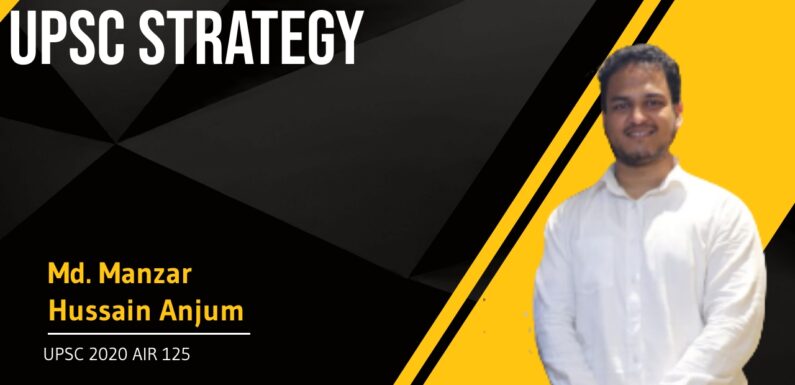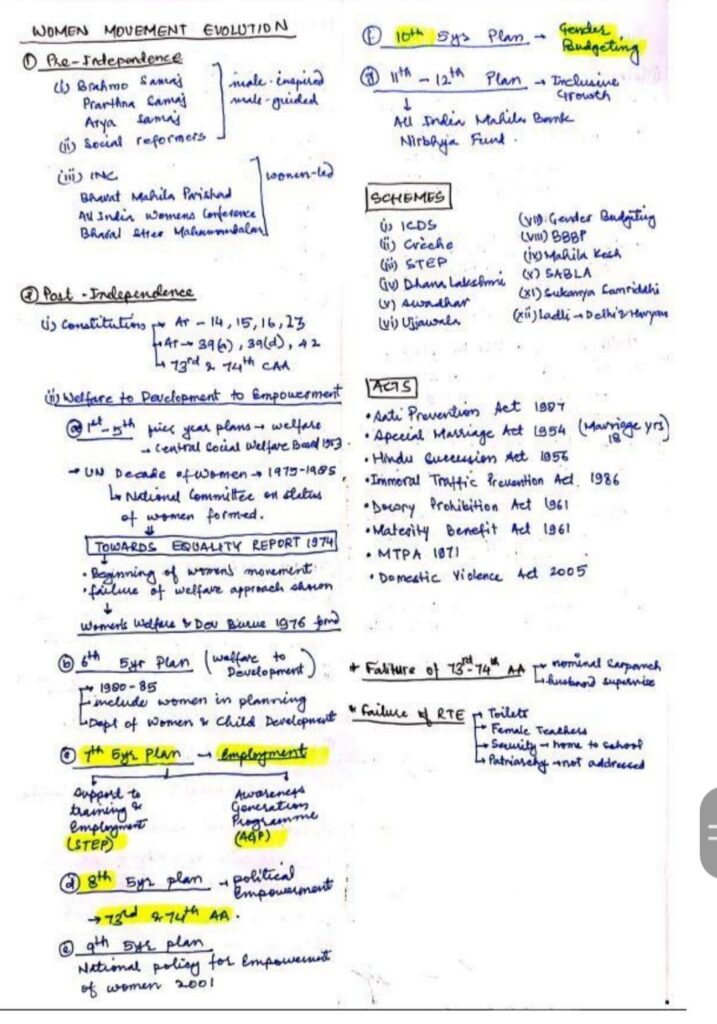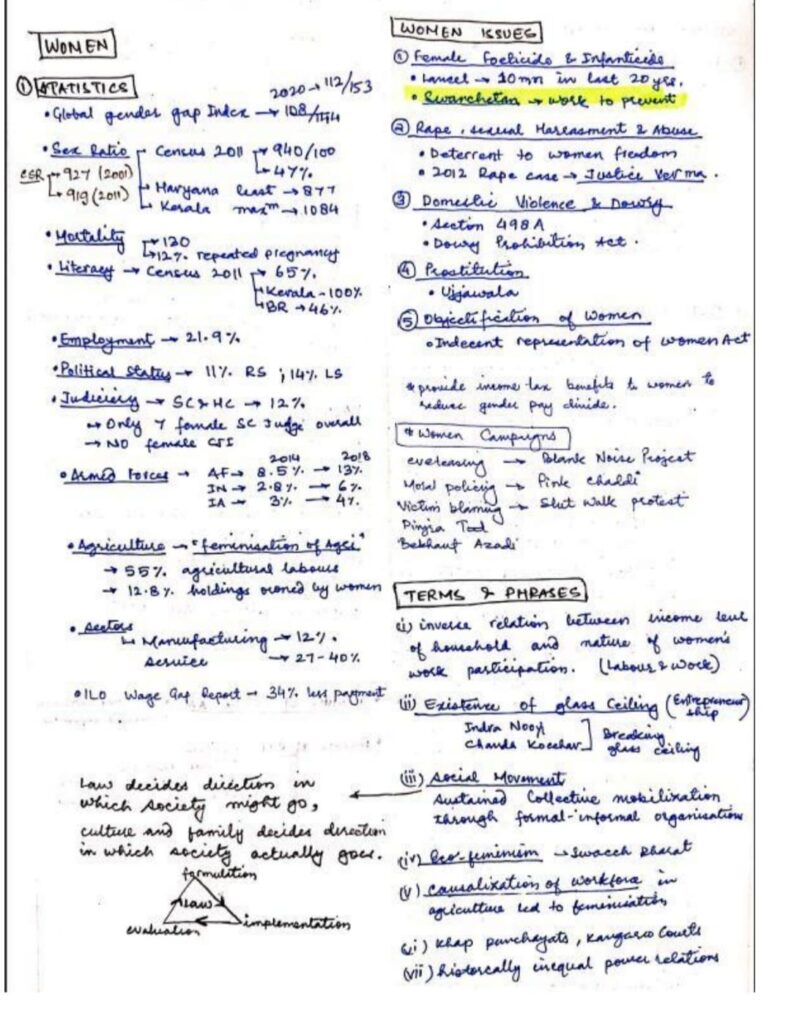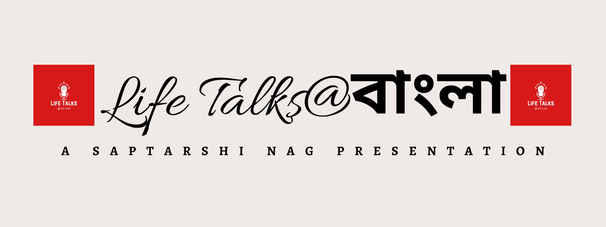
By Md. Manzar Hussain Anjum, IAS
Anything and everything shared in this document is from personal experience. The intention is not to hurt or offend anyone and doing so would only be coincidental.
Hello everyone!
I am Md Manzar Hussain Anjum. I have secured AIR 125 in UPSC CSE 2020. My Optional was GEOGRAPHY and this was my 4th Attempt at UPSC. I am a Civil Engineer graduated with a BT-MT Dual degree from IIT Kanpur. Through this document, I wish to share my UPSC Journey.
After graduation, I joined a consultancy firm working in a programmer analyst role in Mumbai. It was after the results of the 2016 Prelims when I finally decided to prepare for UPSC. My roommate in college had qualified in 2016 prelims and it gave me the courage to appear in the examination (Presently he is an IA&AS officer). After a lot of thought and discussion with my roommate, I quit my job and moved to Delhi to prepare for the examination.
PART 1: Choosing Optional
I came to Delhi in October 2016, without deciding my Optional subject. With a background in civil engineering(CE), I thought perhaps I could take CE as my optional. That would help me appear in other exams like IES and GATE. I talked to many aspirants and selected candidates and came to the following conclusions:
- CE or any other technical subjects have a huge syllabus (big syllabus is common with most optionals. What’s new in that?). The bigger problem is that technical subjects do not have any overlap with other GS or Essay papers in the examination. Hence, it would be difficult to prepare both as the syllabus of GS and CE optional would be too big to manage.
- Other optionals that I could take were from Humanities. The benefit of such optionals is that most of the syllabus has overlap with the syllabus of GS. For example, Geography has overlap with GS1 (basic geography), GS 2 (Vulnerable sections of society), GS 3 (Disaster Management, Agriculture, Climate change, etc); PSIR has overlap with GS1 (World History), GS 2 (Polity and IR) and GS4 (Governance); etc.
- I learnt about various optionals and came to the following conclusions about some optionals:
a. Geography:
- Cons: Huge Syllabus. Readymade Study material not updated regularly with current affairs. Unavailability of topper test papers.
- Pros: Syllabus has a lot of overlap with all GS papers. Technical and easy to understand.
b. Sociology:
- Cons: Huge syllabus. Too much to remember, especially the Thinkers and Philosophers part.
- Readymade study materials updated with current affairs. Topper copies available. Overlap with GS. c. PSIR:
- Cons: None that I can tell.
- Pros: manageable syllabus. Readymade materials available. Scoring.
d. Anthropology:
- Cons: less overlap with GS syllabus
- Pros: Small syllabus. Materials readily available. Very very scoring.
- I decided to take geography as my optional. I liked geography as a kid and felt I still liked it after taking some electives in college. My friends also had geography optional so I felt I would get good guidance from them. Also, the thought of appearing in GATE and IES also faded when I realised that sailing two ships at a time could be disastrous for me and I finally focussed wholly on UPSC CSE.
- With no background in Geography, I began to take classes from Shabbir Sir. I will share my optional notes on my telegram channel- https://t.me/upsc_preparation_ManzarAnjum
- Remarks:
- Choose your optional wisely. Take some time and then decide. Look for the Pros and Cons along with your liking of the subject.
PART 2: General Studies
I had never read newspapers or current affairs ever in my life. I had planned to take GS classes but two things changed my mind. Firstly, I felt classes were too expensive (1.5 lakh approx), which was outside my affordability as I was already paying a lot as room rent staying in Patel Nagar. Secondly, my friends convinced me not to take classes as they had joined classes but didn’t attend them regularly as it felt irrelevant most times.
I failed in the Prelims of 2017 and 2018 due to mismanagement of GS preparation. Some mistakes included:
- Not reading the UPSC syllabus. This is the most important part in preparation for the exam.
- Too much focus on current affairs (dynamic). This led to lack of confidence in basic books related questions.
- Not reading the basic books (static). I had too many sources and didn’t really rationalise the books to be studied.
I shifted from Patel Nagar to Hamdard Study Circle (HSC) in October 2018. I met several aspirants in HSC. The best thing about the crowd in HSC was that most of them were at different stages of the exam, some were selected, some appeared in interviews, some wrote mains, and some absolutely new in preparation. Through a peer group, I learned about the right sources for UPSC.
PART 3 Sources
- Preliminary examination: I divided the syllabus into the following 8 parts:
a. History
- A brief history of modern India, Spectrum’s publication by Rajiv Ahir
- Modern India, NCERT class 12th by Bipin chandra
- Themes of Indian History (NCERTS)
b. Art and Culture
- Tamil Nadu 11th class History book
- Nitin Singhania chapter 1 only
- Themes of Indian History (NCERTS)
- Wiki page of Jainism & Buddhism, Sufi and Bhakti movement
c. Polity
- Indian Polity by Laxmikanth
- Political theory NCERT
d. Geography
- NCERTS 11th and 12th
- Certificate Physical and human Geography by GC Leong
- Notes by https://www.pmfias.com/
e. Economics
- Mrunal Sir video lectures, freely available on Youtube
- Indian Economy key concepts by Sankarganesh Karuppiah
f. Environment
- Booklet by shankarIAS
- Previous years question analysis
- Map Pointing practice, Tiger reserves, NPs, WLS, etc.
g. Science and Technology
- IASparliament booklet on S&T
- Basic Newspaper reading
h. Current Affairs
- The Hindu Newspaper
- Indian Express Newspaper
- VisionIAS current affairs booklet (followed only one current affairs with multiple revisions)
2. Practice for Preliminary examination:
- It’s very important to take mock testsbased on prelims. They are freely
available on this website- https://freeupscmaterials.org/. Take notes from the mock tests taken. I will share how to take notes from test papers on my telegram channel (https://t.me/upsc_preparation_ManzarAnjum)
- Although I took tests from various sources, one source that I liked was that of VisionIAS. Reason being that it is structured in a manner that you are able to revise the syllabus at least twice. The VisionIAS test series is more about
learning and revising than appearing in UPSC examination. Hence it helps cover the whole syllabus in a structured manner.
- Solving previous years question papers is a must. A detailed analysis is needed for all questions and their options. This answer on quora explains this beautifully- https://qr.ae/pGV4Tl
3. Mains Examination:
- Essay:
- Read the topper’s essays.
- Mastering Essay and Answer writing for UPSC book by Dr. Awdhesh Singh sir (Retd. IRS)
- GS1:
- Modern History:
- Same as Prelims
- Art & culture
- Same as Prelims
- Geography
- Same as Prelims
- World History
- I skipped this part as it was not asked recently (consider myself lucky)
- Indian Society:
- Vision value added materials for each topic of the syllabus. (Available freely)
- Insights secure compilation of the previous 8 months. (I will explain about it in detail in this document later.)
- Natural Resources and minerals:
- Notes by https://www.pmfias.com/
- Mrunal sir old website
- Modern History:
c. GS2:
- Polity:
- Same as Prelims
- Governance and e-governance:
- VisionIAS value added material
- Google search for terms
- Strategy for new India @75 years by NITI AAYOG. (This is a holy document prepared for understanding the scenario of many issues for India. Explained later.)
- Role of civil services:
- VisionIAS value added material
- IR:
- Any current affairs magazine for IR
- GS3:
- Economy:
- Same as Prelims
- Internal Security:
- Challenges to internal security of India by Ashok Kumar Sir (IPS)
- VisionIAS Mains 365
- Agriculture:
- Insights Secure compilations for previous 8 months
- Disaster Management:
- VisionIAS value added material on DM
- 2nd ARC summary (Just to pick up phrases, recommendations and keywords.) (Compilation by IASnetwork is one that I followed)
- S&T
- Same as prelims
- Environment
- Same as prelims
- Economy:
- GS4 Ethics
- Decode ethics book by Mudit Jain
- Topper’s answers
- Previous years question papers
- Case Studies:
- VisionIAS document on how to solve case studies (A general document on how to tackle case studies following proper structure)
- 55 case studies discussed by VisionIAS document.
4. Practice for Mains Examination:
- The most important part of mains preparation is answer writing. Every answer has a structure – Introduction, Body and Conclusion. It is important that one internalises this structure in their answers. By internalisation, I mean every answer should have a introduction, body and conclusion by itself and one should do it subconsciously and not put extra effort to write such a structure.
- Go through 15-20 answer copies of toppers to get an idea about the structure.
- This link would be helpful – http://www.visionias.in/resources/toppers_answers.php
c. How to start answer writing?
- Rome was not built in a day. And even if it was built in a day, it might have taken a long time to perfect it. Answer writing takes time. And it attains perfection gradually when you keep writing.
- So, start gradually with 4-5 answers initially with the subject you are comfortable in. I started with geography in GS.
- Initially, do not focus on writing answers in a fixed time. Take more time. Write an answer in 30 minutes initially. It doesn’t matter if you take more
time. Instead, try to inculcate the structure in your answers. Once the structure comes automatically in your answers, start working on reducing the time required.
- Joining a test series for mains is recommended. You can also get the mains test series free on https://freeupscmaterials.org/ website.
- There are other platforms which evaluate your mains answer copies at nominal costs unlike reputed institutes. The catch is, the questions and answers would be provided by you, and the platform would just evaluate them and give you suggestions to improve. The platform I used was https://www.ias.network/.
- For daily practice, almost all websites provide 5 questions daily. I had followed IASbaba TLP Phase 1 and Phase 2
(https://iasbaba.com/think-learn-perform/) with a peer group for answer writing. It helped me immensely to internalize a structure in answers.
PART 4 Interview
Interview is the most decisive stage of the whole examination process where a student may get around 75% of the total marks (275 marks in interview). The following will help prepare well in the interview:
- Be honest with your Detailed Application Form (DAF). Do not bluff or write anything that you haven’t really done just because others have their DAFs full of credentials. Every person is different and UPSC interviewers acknowledge that.
- Prepare every detail of your DAF.
- Example: Your name- meaning, any historical significance, who kept your name, etc.
- Places, job profile, hobbies, etc. all need to be prepared in an honest manner.
- After we get an interview call, we can contact various institutes for mock interviews and these institutes also provide DAF based questionnaires which we can prepare.
- For previous years transcripts, follow this telegram group: https://t.me/PTT2019
PART 5 My strategy
I failed in UPSC CSE prelims in 2017 and 2018. In 2019, I tried to analyse my mistakes and focussed solely on prelims with little preparation for Mains.
1. Prelims Strategy
- Revision of the basic books at least 3 times. It’s important to make the static part strong because that will give you a fair chance to qualify the exam.
- Current affairs from only one source. The source could be of any standard platform.
- IMPORTANT: keeping the syllabus handy. The way I did it was by downloading the visionIAS test series schedule. The schedule helped me know every topic that I needed to prepare and after preparation of those topics, I would appear in the relevant tests (available on https://freeupscmaterials.org/ website).
- After each topic of the syllabus was covered, I solved the previous year’s questions for that topic.
- I prepared notes for every test that I appeared in. The notes were precise with only the topics that I didn’t know or was confused about. I will share a sample of my prelims notes on my telegram channel https://t.me/upsc_preparation_ManzarAnjum
- I would revise the previously appeared tests every sunday. Infact sunday was for revision entirely.
2. Mains Strategy
- After two successive failed attempts at prelims, I decided to entirely focus on prelims in 2019. However, after discussion with seniors I joined VisionIAS mains test series (28 tests). The test series had a schedule and I tried to prepare according to that schedule without backlogs.
- Writing the first few tests was disastrous for me. It took 4.5 hours for me to complete the test. And by complete I mean 15-18 questions as I didn’t know all of the answers. Gradually over time, I tried to reduce the time and increase the number of questions.
- By prelims 2019, I had written around 12 mains based tests. This helped me go through the syllabus once. So far my preparation was organised according to subjects. For example: Polity, economy, environment, history, geography, etc. This is a good way to touch the syllabus once but a poor way to learn if one is about to write mains.
- After prelims 2019, I talked to some seniors regarding mains preparation and most of them asked if I had prepared notes, which I didn’t. I was doomed.
- The most important part of mains preparation is to take a hard copy of the syllabus and prepare 50-100 words on each topic given in the syllabus. This helps to revise more efficiently, remember and recollect better during answer writing. For example:
“Role of women and women’s organization”


- One of the best sources to prepare such notes for all topics is the InsightsonIndia SECURE programme. SECURE programme gives a compilation of current affairs and static based questions every month and for all GS papers. And the best thing is that these questions are sorted as per the syllabus in a bullet format. Almost all questions that can be prepared from that topic are discussed and one can easily make notes from there. It would be better understood if one goes through the link (September 2021 compilations) https://www.insightsonindia.com/2021/10/06/compilations-insightsias-secure-syn opsis-september-2021/
- Another absolutely fabulous document to prepare notes from is the Strategy for new India @75 by NITI AAYOG. This document covers 41 themes with challenges, solutions and way forward for all themes. It is recommended that one sees this document at least once. I have prepared short notes for this given under my GS3 Notes.
- The 2nd ARC summary is also a government document that would provide good keywords for note making. It’s better to use this document as a value addition for already prepared notes.
- One more free source to prepare notes is the IASnetwork platform. It provides notes for each GS paper. But always prepare your own notes and not just rely on other’s notes. https://www.ias.network/
- Between prelims and mains, I wrote VisionIAS test series (8 Tests) and practiced answer writing with some friends on a daily basis for one hour (7 questions in one hour).
My notes:
- Mains Test series: 2019:https://drive.google.com/drive/folders/1nSEmsVgRMeC8MQQVv2NyoDIcg8GQ5B ng?usp=sharing
2020:https://drive.google.com/drive/folders/1CzOWz-STUCZm0cN-Cn6vOClma9fjhoOn? usp=sharing
- GS Notes: (I have also shared my daily answer writing booklet. One can see the difference from beginning to end) https://drive.google.com/drive/folders/1ZEGrgsRGrsYBQ9c2PQH22sAd42rXA35T?usp= sharing
- Optional: https://drive.google.com/drive/folders/1_0u7aMr0C0ClixcNuzZ5uVttFFrKafSt?usp=shari ng
One of the most important things in the whole preparation is newspaper reading. I read The Hindu religiously first thing in the morning everyday. I didn’t take notes regularly, however, I always updated my notes using the data or case studies or any good analysis or phrases given in the newspaper.
For example: “It is not the size of the economy that matters, but the shape of the economy that defines the inclusivity in a nation.”
I have tried to detail everything in this document and hope that it helps my fellow aspirants.
I followed all the above things for four years. It takes a toll on one’s confidence, determination, physical, mental and emotional health. So I would say discipline and perseverance is the key to remaining consistent in this preparation. During my preparation, I would always tell myself that I should enjoy the process and not be perturbed by the huge syllabus or complex examination process. And always see the light at the end of the tunnel. Remember why you wanted to do it in the first place.
“Don’t downgrade your dream just to fit your reality, upgrade your conviction to match your destiny.”
Regards,
Md Manzar Hussain Anjum AIR 125 – UPSC CSE 2020
Email: iasmanzar@gmail.com









